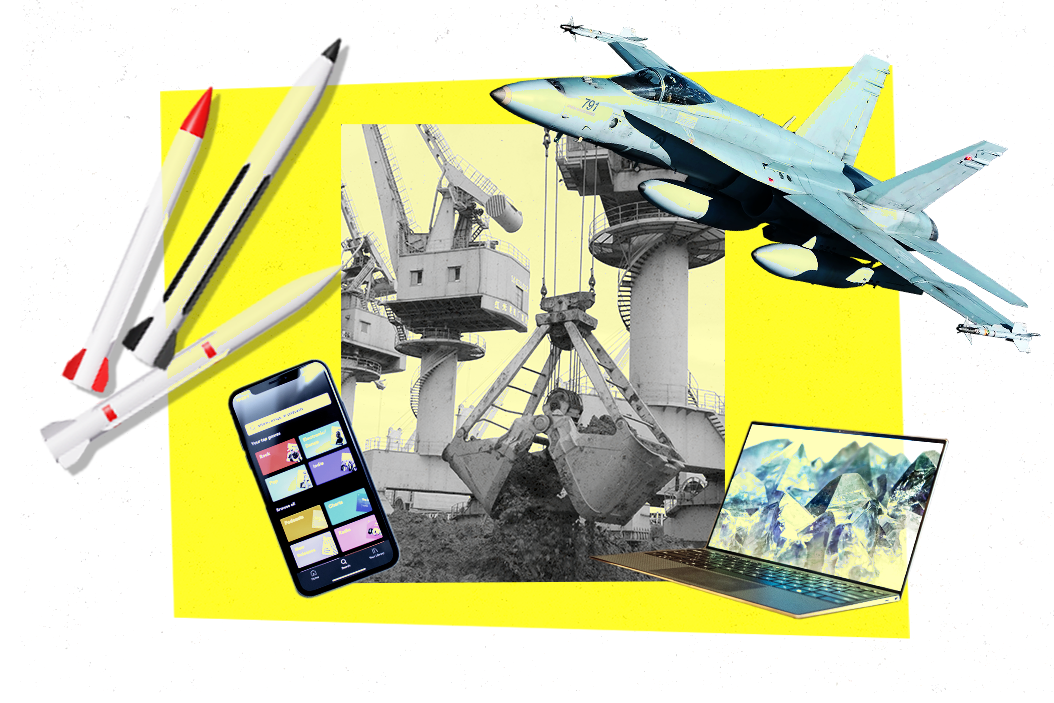China now controls more than 80 percent of the world's supply of something that surrounds you all day, every day. And, according to the Financial Times [paywall], Beijing is threatening to cut the supply of that thing to the US. What are we talking about? Rare earths metals.
What are rare earth metals and why should you care about them? Rare earth metals are critical for manufacturing just about every electronic device that you, and all of the world's modern militaries, use every day. They're essential for making screens, hard drives, and precision glass.
Without rare earths, you can't use a cell phone, save a document, watch a Netflix series, drive a new car, take a digital photograph, fly a drone, target a missile, or build a fighter jet. You wouldn't even be able to read Signal — though we promise to make hard copies available if it comes to that.
It just so happens that China has a near-monopoly on the business of refining these metals for use in manufacturing. Since the 1990s, when environmental regulations in the US made it cheaper to refine rare earths in China, Beijing's share of the industry has risen from about 30 percent to more than 80 percent today. With that kind of market power, China can throw its weight around, and the US-China rivalry over technology creates a powerful incentive to do just that.
What is China threatening? According to the Financial Times scoop, China is conducting a fresh study to determine whether cutting off rare earths exports to the US would cripple the US defense industry, which relies on the stuff to make all of its key weapons systems. A single F-35 fighter jet, for example, contains close to 1,000 pounds of rare earths metals, according to a US congressional report.
The Pentagon knows all this, right? Of course. For years, Pentagon planners have been looking for ways to secure more access to rare earths mines, in particular by making inroads in southern African countries that are rich in reserves. And the Trump administration last year issued an emergency order to boost rare earths production in the US.
But the challenge isn't so much in finding rare earths — which are, despite their name, present all over the world, including in the US. It's extracting them and then refining them that costs and pollutes a lot. Private investors haven't been able to make it profitable under US rules, so US agencies and lawmakers have explored subsidizing production or making regulatory changes that make more rare earths available for refining.
But for a Biden administration that has put environmental protection at the center of its agenda, this could mean a tough tradeoff: protect the defense industry and Silicon Valley, or protect the environment.
Would China really do this? Cutting off rare earth supplies to the US would be a huge blow to the US defense industry, and could also complicate things for Silicon Valley, which relies on Chinese rare earths as well — though less so because so much of their manufacturing is actually in China at the moment.
Washington would almost certainly respond with severe sanctions or export limitations of its own. The US has already moved to limit China's ability to buy semiconductors, an area where China is almost entirely dependent on the outside world, in particular on Taiwan.
- Why John Kerry’s trip to China matters for all of us - GZERO Media ›
- The future of the Chinese Communist Party - GZERO Media ›
- Will China's tech sector be held back? - GZERO Media ›
- China and US economic interdependence hasn't lessened - GZERO Media ›
- China and US economic interdependence hasn't lessened - GZERO Media ›
- Taiwan’s outsize importance in manufacturing semiconductor chips - GZERO Media ›
- Should investors bet on China over the US? Ray Dalio's view - GZERO Media ›
- Nicholas Thompson on China's tech U-turn - GZERO Media ›
More For You
In this "ask ian," Ian Bremmer analyzes Trump’s recent meeting with Zelensky and how close (or far) Russia and Ukraine are from a peace deal.
Most Popular
Before turning to Top Risks 2026, Ian Bremmer looks back at how this year’s Top Risks 2025 actually performed.
In the latest twist to Yemen’s decade-long civil war, a group of government ministers declared support for the UAE-backed Southern Transitional Council (STC), a rebel group that broke the war’s deadlock earlier this month by seizing control of the oil-rich Handramout region.
